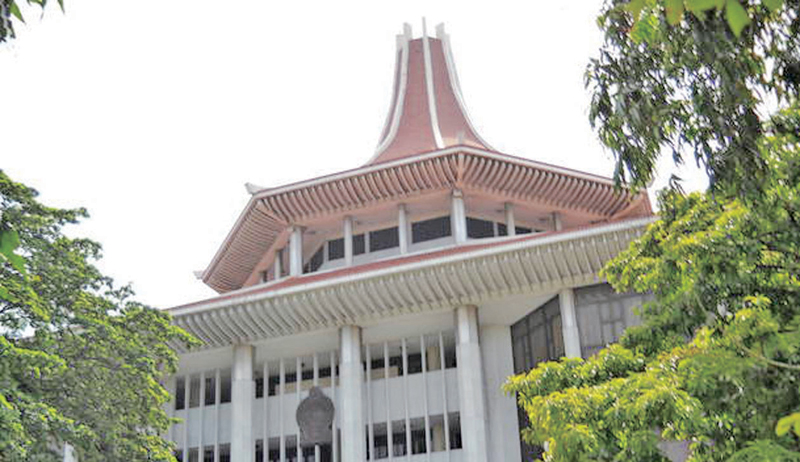The Supreme Court three-judge-Bench headed by Chief Justice Nalin Perera yesterday, unanimously issued an Interim Order staying the operation of the Gazette notification issued by the President to dissolve Parliament. This Interim Order will be effective until December 7.
The three-Judge Bench of the Supreme Court comprising Chief Justice Nalin Perera, Justice Priyantha Jayawardena and Justice Prasanna Jayawardena further issued an Interim Order restraining the Election Commission from proceeding to take any steps to conduct the Parliamentary Election by virtue of the proclamation until December 7.
Taking into consideration the facts presented by all parties, the Supreme Court granted leave to proceed with Fundamental Rights petitions in terms of Article 12(1) of the constitution. Accordingly, 10 petitions filed by various political parties and several individuals were fixed for argument on December 4, 5 and 6.
The petitions were filed by Tamil National Alliance leader R. Sampanthan, UNP General Secretary Kabir Hashim, JVP leader Anura Kumara Dissanayake, Sri Lanka Muslim Congress leader Rauff Hakeem, All Ceylon Makkal Congress Party leader Rishad Bathiudeen, R. A. S. D. Perera, Prof. S. Ratnajeevan H. Hoole, MP Mano Ganeshan, Attorney-at-Law Lal Wijenayake, G. C. J. Perera, Attorney-at-Law Aruna Laksiri, Attorney-at-Law Nagananda Kodituwakku and Chamara Sumanapala.
They sought an Interim Order to suspend the proclamation. The Petitioners state that upon the Proclamation being published, the Petitioners were of the view that the Proclamation dissolving Parliament was unconstitutional and illegal.
Attorney General Jayantha Jayasuriya PC yesterday, informed Supreme Court that the President has discretionary powers to dissolve Parliament under Article 33(2) and 70 of the Constitution.
Making his oral submissions regarding the Fundamental Rights petitions filed challenging the President’s decision to dissolve Parliament last Friday, the Attorney General stated that the primary executive powers to dissolve Parliament is vested with the President.
The Attorney General said the President has power to summon, prorogue and dissolve Parliament in terms of Article 33 (2) (C) of the Constitution.
The Attorney General further submitted to Court that the 19th Amendment to the Constitution in terms of Article 62(2) of the Constitution, has recognized the possibility of dissolution of Parliament even prior to the completion of the five-year period of Parliament.
The Attorney General said Article 70 of the Constitution stipulates ‘the President may by proclamation, summon, prorogue and dissolve Parliament’.
The Attorney General further submitted to Court that the Supreme Court in its determination regarding the 19th Amendment to the Constitution, had not recognized any ceremonial position for the Presidency.
“The President has discretionary powers to dissolve Parliament - that was what happened through the Proclamation,” he said.
The Attorney General submitted that the proclamation issued by President has given citizens an opportunity to take a decision at a General Election.
He stated that the President has given reasons for the dissolution of Parliament through a public speech. “Even though there are certain limitations under Article 70(1) of the Constitution, the President has discretionary powers to dissolve Parliament on other occasions. There is no limitation of power vested with the President under 19th Amendment to the Constitution. Under the 1978 Constitution, the Ceremonial Presidency was converted to an Executive Presidency. The President’s power to dissolve Parliament is very clear and unambiguous. This discretionary power is vested in the President,” the Attorney General added.
‘The President acted within the powers of the Constitution and followed the constitutionally mandated process. Any encroachment to this process would violate people’s franchise rights. The Proclamation has been made by the President using constitutional powers to exercise the people’s franchise rights. I move court to dismiss these applications in limine,” the Attorney General said.
Meanwhile, President’s Counsel Sanjeewa Jayawardena appearing on behalf of Prof. G.L. Peiris, an intervenient petitioner submitted to Court that the petitioners cannot seek the Supreme Court’s jurisdiction seeking an interpretation through a Fundamental Rights petition. “The President resorted to dissolve Parliament since substantial powers are given to him to do so,” he added.
President’s Counsel Gamini Marapana appearing for Prof. Channa Jayasumana submitted to Court that the Constitution has given unfettered power to dissolve Parliament at any time.
In response to the intervening petitioners, M.A. Sumanthiran stated that Article 70 and 33(2) cannot be de-linked as suggested. “They are intrinsically connected and any interpretation suggesting otherwise is rash and can lead to dire consequences.” Meanwhile, a speech that was made by Prof. G.L. Peiris in Parliament on a previous occasion stating that Parliament cannot be dissolved unilaterally before the lapse of four and a half years was quoted in Court by Kanag-Iswaran PC.
President’s Counsel K. Kanag-Iswaran with M.A. Sumanthiran PC, Thilak Marapana PC, C.J. Weliamuna PC, Dr. Jayampathy Wickremaratne PC, counsel H. Hizbullah and Manjula Balasuriya appeared for the petitioners.
Attorney General Jayantha Jayasuriya PC, Solicitor General Dappula De Livera, Additional Solicitor General Indika Demuni de Silva PC, Nerin Pulle DSG and Dr. Avanthi Perera SSC appeared for the Attorney General.



Add new comment